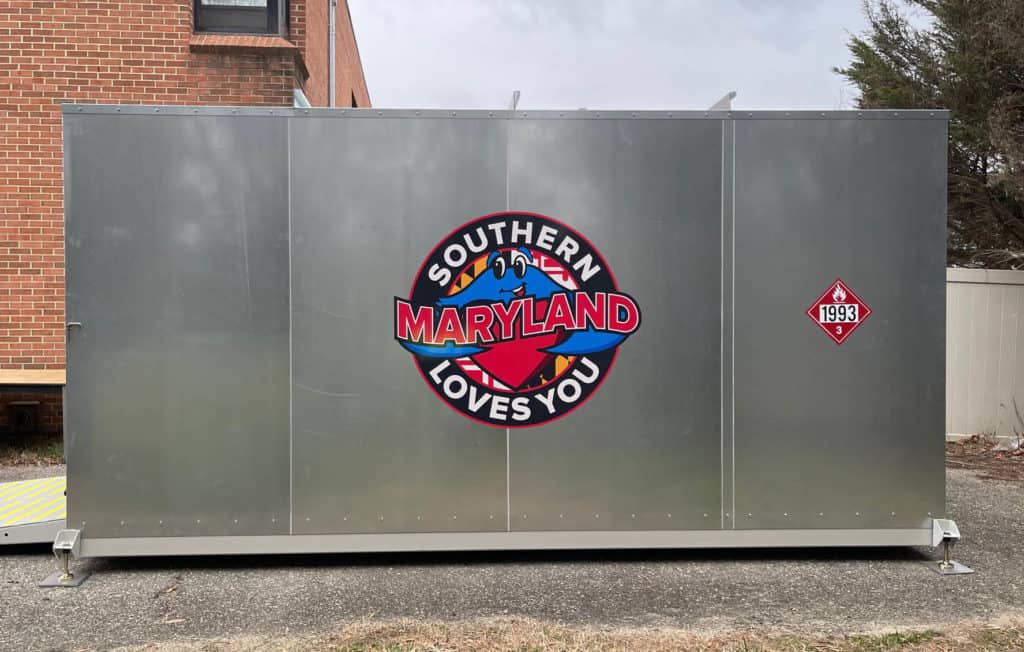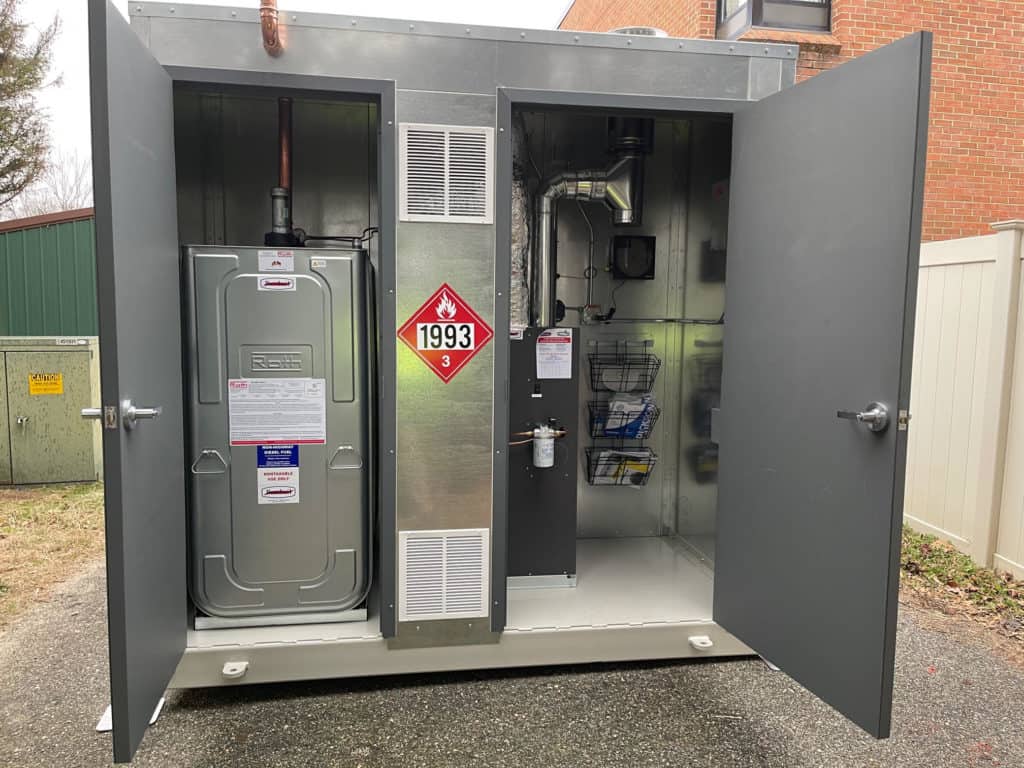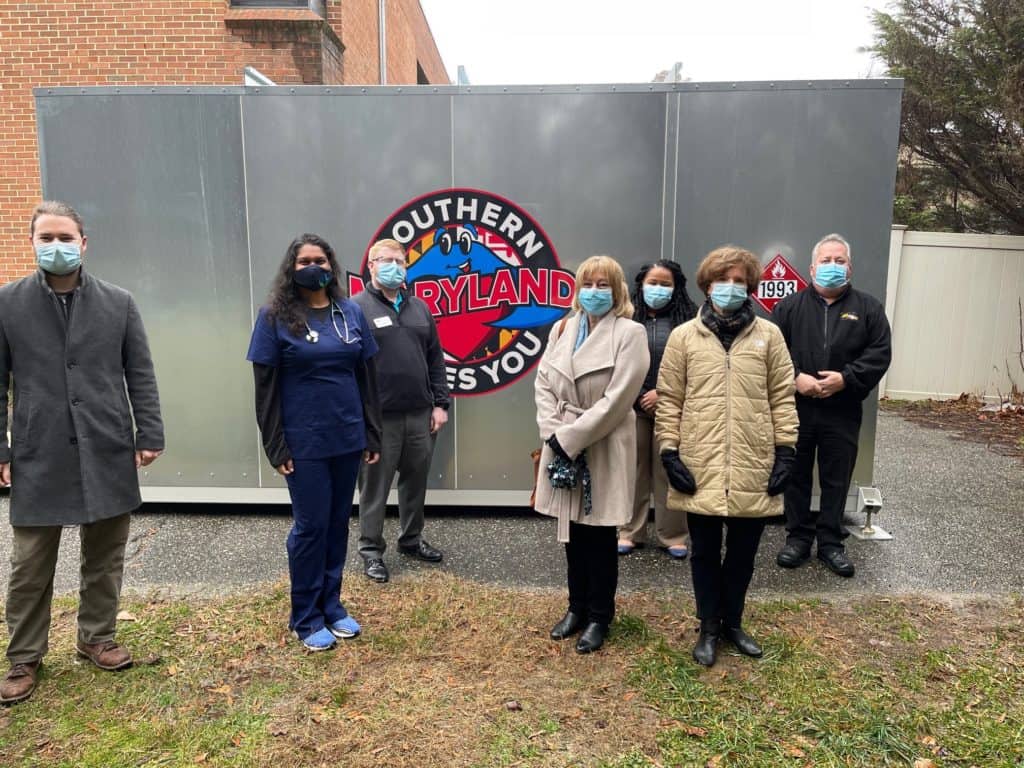Battling a Virus with Knowledge



From left: Matt Hayes, inventor of heat box and executive director of SoMD Loves You; Dr. Meenakshi Brewster, St. Mary’s County Health Officer; Russell Keogler, administrator at Charlotte Hall Veterans Home; Sharon Murphy, director of MDVA/CHVH; Zenae Merchant, asst. administrator at CHVH; Barbara Ives, retired Navy captain and president of SoMD Loves You; Rodney Jones, Deputy Director of MDVA/CHVH.
Southern Md. Innovators Create PPE Cleaning Tool
By Kathy Knotts
A group of Southern Maryland entrepreneurs and manufacturers teamed up last year to put their knowledge and skills to use fighting the coronavirus, and now they have a new invention to show for it.
In the early months of the emerging pandemic, Tommy Luginbill, director of TechPort in St. Mary’s County, and Matt Hayes, owner of Unmanned Propulsion Development, had shut down the majority of their operations in the county’s Airport Innovation District. They knew they had the skills and motivation to help those on the frontlines of the crisis.
“There were just a few of us left in the large, empty TechPort building, which gave us a safe workspace to start designing and prototyping products to support people during the pandemic,” says Luginbill. “We started out making masks and face shields, but the demand for PPE was so high, it was just impossible to keep up. Then we realized what health care facilities really needed was a method to clean and reuse the PPE they already had.”
They began experimenting with different methods, including UV light, which wasn’t practical because the lightbulbs were expensive and hard to obtain, and hydrogen peroxide, which was too hazardous and too energy intensive to make. Then, Hayes came up with the idea to build a giant oven that would clean PPE by simply “baking” it with dry heat.
“After many sleepless nights, it became evident heat was the way to solve our problem,” Hayes says. “Heat is simple. It penetrates everything. It’s universal. Everybody can use a hot box.”
The group turned their focus to using a dry heat oven to sterilize equipment. To get the prototype developed, Hayes established a 501c(3) non-profit organization, Southern Maryland Loves You, and began reaching out to local manufacturers for potential partners. They approached Triton Defense in Hollywood, who specialize in building electromagnetic (EMP) and high-altitude electromagnetic pulse (HEMP) protection modules that were similar in concept to the oven.
“When Matt first came to us, he asked us if it was possible to sandblast and paint existing containers in about four days, which we couldn’t do,” says Jason Norris, vice president of operations at Triton Defense. “But once we understood his idea, we realized it would be much faster to design and build the structure if we started with raw materials. We knew it was for a good cause, and we wanted to do our part to help the community, so we offered to donate our time and the materials. Our management team was heavily involved, and I put five or six of my top guys on the project, and we worked to get it done as quickly as we could.”
Using galvanized steel and A36 grade steel, Triton built the model within one week. At the same time, local heating contractor Burch Oil volunteered to install the oven’s HVAC equipment, and Southern Maryland Loves You soon had a working prototype of their 16-feet long, 8-feet wide, and 8-feet high “Hot Box,” known technically as the Semi-Automated Heat Bioburden Reduction Module.
With the Hot Box built, the team partnered with the University of Maryland Charles Regional Medical Center to test it and ensure it was indeed effective in cleaning PPE for repeated use. With guidance from the FDA, the team tested to make sure their process effectively reduced the biomass of the COVID-19 virus, as well as other viruses and bacteria, without hurting the integrity of N95 masks and other PPE equipment.
After eight months of testing and submitting data, the Southern Maryland Loves You team achieved a significant milestone—the FDA published new guidelines on using dry heat to support single-user reuse of N95 masks and verified the “oven” falls within these guidelines, with a Tier-3 Rating in the Bioburden Reduction Module category. This announcement meant the staff at UM Charles Regional Medical Center could now safely reuse their N95 masks after being treated in the Hot Box and allowed Hayes and Luginbill to begin offering the device to other health care facilities.
Charlotte Hall Veterans Home was the latest lucky recipient of a Hot Box, donated to the facility by the St. Mary’s County Health Dept. The unit can cycle up to 24,000 masks daily, and can also be used for clothing, mattresses and gowns. The sterilization process takes about one hour.
“We came up with a concept and proved that it worked,” says Luginbill. “It had never been proposed to the FDA that dry heat could be used to kill a virus.”
“When we first came up with this idea, not a lot of people took us seriously. Mike Kelleher at The Maryland Manufacturing Extension Partnership was one of the first people who took us seriously and pledged his support for a grant application, and that meant a lot to us,” says Luginbill. “Then, the fact that we were able to gain support from an established metal manufacturing facility and a large HVAC company who both generously donated their materials, time and manpower to help us build the prototype so quickly – that support made all the difference in getting this done and helping us move forward. Now, we encourage anyone who likes our idea to please tell other people about it and share it with your local legislators – our Hot Box is not an expensive product, it’s simple to use, and it will drastically help our medical community.”
Find more at https://www.somdlovesyou.org/ and https://www.mdmep.org/
